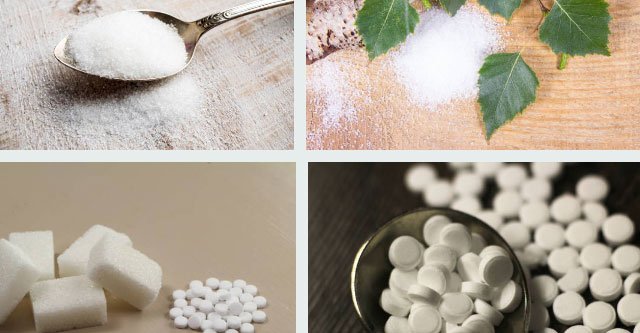Last Updated on July 25, 2021 by Dr Sharon Baisil MD
Going sugar-free is one of the primary needs of managing your diabetic health. Many sugar-free sugars are out there, meant to keep away high-sugar or high-calorie intakes.
They are claimed to be safe and better for diabetic health, as well as for weight management. They are advised to be good ways to reduce blood sugar spikes.
However, these are to be taken in minimum quantities and with total awareness. There are many types of artificial sugars out there.
Artificial sugars are chemical sweeteners that are very concentrated. This enables you to have a very little amount of it and reduces overall calories contributed.
Several health experts suggest using artificial sweeteners over regular sugars. This is because they have almost no calories and need to be used in very small amounts.
Artificial sugars generally sensitize the sugar receptors on your tongue. They, however, have a different structure than regular natural sugar. The breakdown of these artificial varieties of sugars is not so simple, and they contribute to either no or hardly any calories.
These are also good items to replace your regular sugary foods with. The right type of artificial sweeteners can also help you reduce overall body weight and positively influence your appetite.
These artificial sweeteners are suggested to diabetic individuals as they are safe and low in calories. They do not lead to any harmful spikes in the sugar levels of patients with diabetes.
Moreover, many diabetic sweeteners are made with added nutritional benefits. They often contain antioxidants, anti-diabetic properties, and other added advantages to help with diabetes control.
The effects of artificial sugars may vary depending on your health and diabetic conditions. Therefore, you should always consult your doctors about using different substitutes and learn about their effects on your health.
5 Best Artificial Sweeteners for Diabetes, Without Aftertaste

Being low or devoid of calories makes artificial sweeteners a savior for diabetic cravings. These artificial sugars are healthier and safer than natural white sugars and may assist in managing diabetes.
There are many artificial sugars to choose from. Over time, more concentrated, healthier, and safer versions have come up. They are also better in taste and do not have any bitter after tastes.
The bitter aftertaste can be discomforting and can often spoil the dish. Artificial sugars tend to have a bitter taste that lingers due to their chemical composition. Some of the most common diabetic sugars like stevia, aspartame, etc., tend to have a bitter aftertaste.
Here we have five efficient artificial sweeteners that are safe for diabetes and have no aftertaste.
(The list of the artificial diabetic sweeteners given below is chosen on general recommendations.)
The varieties are as follows:
1. Tagatose
This is a medicinal and safe sugar variety used as an artificial sugar to tackle high blood glucose levels among diabetic patients.
It is very efficient as cooking or baking sugar. This variety is often mixed with other artificial sweeteners because of its potential to prevent the bitter aftertaste.
Hence, Tagatose sugars do not have a bitter aftertaste. Tagatose is said to be very sweet as compared to regular sugar. It is 90% sweeter and must be used in low amounts.
It does not only assist in lowering your blood sugar levels but also adds more benefits. It is said to increase the body’s response to insulin. This can be very helpful in keeping diabetes under control.
It is also recommended to patients who are obese. The low calorie and sweet effectiveness in this sugar are commendable. However, it is to be taken in regular amounts and under your doctor’s warnings only.
Click here to check the price on Amazon
2. Saccharin
This is one of the many artificial sweeteners that do not have an aftertaste when used rightly. It is overly sweet and can be used in very small amounts.
However, when used in higher quantities, it can leave a bitter taste. This is a good way to test if you are having more than recommended levels of this sugar.
Saccharin is to be efficiently used as it has limits. Overdoing these limits makes you aware by leaving a bitter aftertaste.
Saccharin may have different effects on different consumers based on their taste receptors. Generally, this artificial sugar is used for its intensely sweet taste.
Higher concentrations of it give rise to an unpleasant aftertaste. So it must be used in quantities under control.
Click here to the check the price on Amazon
3. Erythritol
This is a common sugar alcohol. It is one of the closest varieties of artificial sugars to taste like regular sugar. It is sweet and also safe for diabetic patients.
Erythritol does not have a lingering aftertaste like other artificial sugars. It does not leave your mouth tasting bitter after consuming it.
The aftertaste of Erythritol is often very short-lasting and does not affect the taste buds as much.
It has a fresh and sweet feeling that is more pleasant. It is a safe alcoholic sugar with a glycemic index ranging from 0 – 1. It also has virtually no calories at all.
It is often used to mix with other artificial sugars due to its better taste and no lingering aftertaste.
Click here to check the price on Amazon
4. Xylitol
Like Erythritol, this is also a popularly used sugar alcohol. It is also one of the recommended varieties of artificial sugars if you look for one with no aftertaste.
Xylitol is great to taste, very similar to sugar, and comes with no aftertaste. It is safe for diabetic consumption but must be done in regulated quantities.
It is also one of the favorite sugar varieties used in making baked goods. It is almost as sweet as sugar.
However, xylitol has more calories in comparison to Erythritol. This is a reason why xylitol must be had in fewer amounts.
Besides, xylitol is a great sugar substitute for diabetes as it has many other benefits as well. It positively impacts the good gut bacteria in the body and encourages better digestion. It almost acts like soluble fiber.
It also has no negative impacts on diabetic blood glucose and insulin levels.
Click here to check the price on Amazon
5. Inulin
Along with xylitol and Erythritol, inulin is also sugar alcohol. It is, however, less sweet in comparison to regular sugar. Nevertheless, it is a healthy pick for diabetes is.
Inulin is said to be good for controlling your blood sugar levels. It is low in calories and does not have a lingering aftertaste.
This makes it one of the commonly used sugar-free sugars used in many baked goods. It is a healthy substitute for sugar in foods and beverages.
Inulin is also good for overweight adults. It has an added benefit for diabetic patients as it assists in increasing insulin sensitivity in the body.
Studies have shown that inulin has a lowering effect on postprandial blood sugar levels.
Overuse of this artificial sugar is unadvisable. It can cause side effects in the stomach.
Care must be taken with each type of sugar and the side effects considered beforehand.
Even with the many safe available varieties of artificial sugars, one must improve their dietary choices for aiming towards diabetic management. A combined effort at proper diet, exercise, and medication lead to an overall healthy lifestyle.
Click here to check the price on Amazon
What to look for in an artificial sweetener?
There are tons of types and divisions of artificial sweeteners out there. There are different kinds of sugars, different added ingredients, different brands, and so on.
On this sea of choices, do you know which one is the one for you? Among the many options all around, which one fits your needs and your health situation the best?
There are some ways to find out what sugars are best and how to choose among them. Some of them are:
- Compare the many brands available
- Look for zero-calorie varieties
- Do prior research about the side effects of the type you are looking for
- Consider your uses of sugar and look for baking sugar, cooking sugar, or table sugar, separately
- Consider your other health issues like – blood pressure
- And
- Talk to your doctors for any pre-existing conditions or side effects
Other factors also include differences in sweetness concentration, texture – powdered, granule, or liquids, and so on.
References
- https://www.sciencedirect.com/science/article/pii/S0019483218300142
- https://www.tandfonline.com/doi/full/10.1080/19490976.2015.1017700
- https://www.researchgate.net/profile/Adekunle-Sanyaolu/publication/329328224_Artificial_sweeteners_and_their_association_with_Diabetes_A_review/links/5c316cd5a6fdccd6b59630b9/Artificial-sweeteners-and-their-association-with-Diabetes-A-review.pdf
- https://journals.sagepub.com/doi/abs/10.1177/216507990805600604
- https://www.ncbi.nlm.nih.gov/pmc/articles/PMC4899993/
- https://agris.fao.org/agris-search/search.do?recordID=US8922753
- https://www.nature.com/articles/nature13793?tdc_uid=921043
- https://akjournals.com/view/journals/036/97/4/article-p401.xml
- https://link.springer.com/article/10.1007/s13197-011-0571-1
- https://care.diabetesjournals.org/content/36/12/e202?utm_source=TrendMD&utm_medium=cpc&utm_campaign=Diabetes_Care_TrendMD_0









